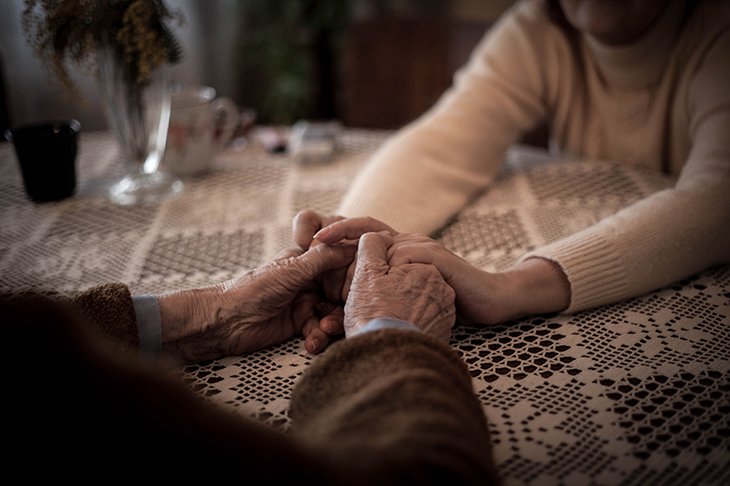My beloved grandmother died at 90, and my mother at 89, after having Alzheimer’s for 11 years. So I am not rattled by the old; I find their memory lapses challenging rather than frightening. (If I were the full-time carer of an elderly husband, it might be another matter. One woman described it as being strangled slowly by a python.)
I recently visited 96-year-old Sir Peregrine Worsthorne, former columnist, journalist and editor of the Sunday Telegraph, at his house in Bucks. In May, his wife (writer Lucinda Lambton) and a kind Croatian carer were present. This time, the two of us were alone for three hours. Perhaps this made it easier for Perry, and me, to focus.
I brought up key figures from his past. When I mentioned the deceased Telegraph writer Colin Welch, Perry responded: ‘Yes, we were great friends. We were at school together. We went into the army together. We were in a show together. His son came here a few days ago. He comes very often.’ (I checked with Welch’s daughter Frances and she confirmed all this; her brother Nick visits frequently.)
He could recall some incidents with clarity. ‘Do you remember going to Italy, you and me?’ he asked, with a laugh. Yes, we had driven together from Pisa airport to his father-in-law’s house. ‘I remember it all very clearly!’ he declared.
At other times, his memories were more muddled. I mentioned Pamela Berry, wife of Michael Berry, his former Telegraph employer.
‘I was very fond of her. Is she still alive?’
When I said she’d died a while ago (1982), he exclaimed ‘Oh no!’ and then declared: ‘She had a lavish life.’
What about old family? Did he remember his mother?
‘Very distantly.’
Although he was physically helpless for all of my visit, Perry retained his beautiful manners and seemed concerned when I brought his lunch that I might not be going to have some too. I found his company soothing and didn’t mind that he couldn’t always summon the words that were in his brain. After all, it was more frustrating for him than me.
Many readers will be familiar with the sorts of excuses one hears far too often from friends of those who are suffering from memory loss. ‘No point visiting. He’s too far gone.’ ‘No, I haven’t been to see her. I gather she’s out with the fairies.’ Are diagnoses of Alzheimer’s or dementia perhaps giving potential visitors a get-out? These medical terms, though important concerning medication and future cures, tend to separate ‘us’ from ‘them’. There’s also the fear of ending up like ‘them’, as is eloquently illustrated by the psychiatrist Colin Brewer’s new book title: O, Let me not get Alzheimer’s, Sweet Heaven! I understand it’s painful to see someone you’ve known as full of life sometimes talking gibberish, but we must not abandon that person.
Cynthia Kee, who turned 90 in May, is another friend of mine with memory loss. It was in her house in Goodge Street that I first met Perry, at one of her parties. Cynthia can be vague about the present but she tells lively anecdotes about her early life. She was told she was too fat to be a -dancer (though in her eighties she jitterbugged regularly at the 100 Club on Oxford Street) so instead she became a journalist. She got a job on Smallholder magazine. For her first story she had to cover a reception — ‘John Innes No. 2 Compost’. She ending up writing a weekly ‘Pig and Poultry’ piece. After winning the Vogue talent contest, she went on to work at the photojournalistic magazine Picture Post, and then became one of the few women in television at the time, where she found interviewees as a researcher on the BBC’s Tonight programme. (Nina Simone, her favourite, asked Cynthia for ‘haff a boiled egg’.)
It was Cynthia’s idea for the Guyanese actor and musician Cy Grant — the first black person to appear regularly on British TV — to sing a calypso each day on Tonight that contained a synopsis of current events. Bernard Levin came up with the words and sent them daily from The Spectator in a taxi. Cynthia met her future husband, the writer Robert Kee, at a Spectator party — she recalls guests excitedly murmuring his name — and later went with him to Augustus John’s flat in Fitzrovia where John, she says, would pee in the sink among unwashed crockery.
We must keep listening to the very old. It’s like panning for gold — every so often we may find treasure.
Got something to add? Join the discussion and comment below.
Get 10 issues for just $10
Subscribe to The Spectator Australia today for the next 10 magazine issues, plus full online access, for just $10.
You might disagree with half of it, but you’ll enjoy reading all of it. Try your first month for free, then just $2 a week for the remainder of your first year.














Comments
Don't miss out
Join the conversation with other Spectator Australia readers. Subscribe to leave a comment.
SUBSCRIBEAlready a subscriber? Log in